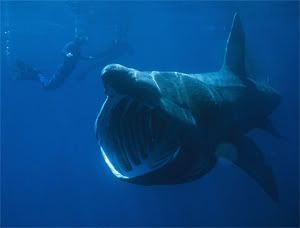
photo credit Chris Gotschalk
Recently I was lucky enough to be able to attend a monthly meeting of the Marine Conservation Society (MCS) UK South East branch in London. The speaker of the evening was Evan Landy, an M.Sc. researcher from the University of Exeter, and the topic was basking sharks.
I've long been fascinated by these huge, ancient-looking fish. They are the second largest fish alive (after the whale shark), reaching 30 - 40 feet and weighing on average just over 5 tons. Despite this, basking sharks feed on some of the tiniest creatures in the ocean, passively filter-feeding delicious copepods from the sea surface as they lazily swim by. Despite their somewhat scary appearance, they pose no threat to humans and are a popular dive attraction.
Aside from learning when and where to go visit these amazing sharks (and that they're so big you can actually see them from shore!), I learned that we actually have something in common - the sharks and I. Landy's research has been on mapping populations and distributions of basking sharks around the United Kingdom, and it turns out they just happen to like warm sunny beaches and nice weather. What a coincidence. We should hang out some time.
Landy mentioned spotting sharks the past few years has been a challenge possibly due to the less-than-fantastic summers in the British Isles recently. MCS is looking for the public to report their sightings of basking sharks (and other creatures) on their website to help map where the animals are spending their time. Future work with this species will be aimed at training fishermen to report their sightings while at sea, satellite tagging and genetics.
For more information on the work of MCS, visit their website. Meetings of the South East branch are held on the second Tuesday of each month from 8:00 - 10:00pm, in the function room at the Holland Club, Imperial College, Kensington, London, SW7.
No comments:
Post a Comment